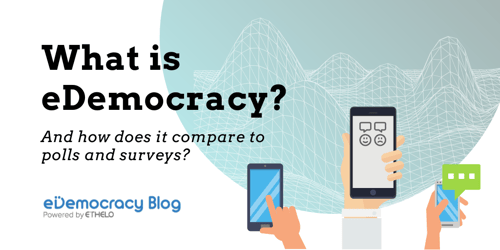.png?width=1000&name=Democracy%20%26%20Social%20Distancing%20(2).png)
Times of crisis are when democracies face their greatest challenges, and also when they show their greatest strengths.
In recent weeks, we have seen governments around the world put to the test as they race - or not - to implement policies dealing with the new pandemic. The performance of democracies has been mixed, but on the whole, effective. Even where the initial response was wrong, built-in feedback loops – free flow of information, public criticism, and the like – enabled relatively fast correction. Here in Canada we have reasons to be both hopeful and concerned, but on the whole our different levels of government appear to be responding well.
The real strength of democracies, however, is not in the short game, but in the longer marathon of maintaining social cohesion and eventual resumption of normal life. This should not be taken for granted however. Democracies only excel in the long term when governments engage the public in deliberative policy making and the public is able to provide input that is taken into account. This is always hard but especially so in a time of social distancing.  The Coronavirus is presenting democracy with a new challenge. The Right of Assembly is one of the foundations of our - and all - democracy’s constitutions. Town halls, meetings, even polling stations and marches - long seen as the true expression of democracy - are no longer available as means of collective action. Internet-based technology - “eDemocracy” cannot only fill the void left by social distancing, but may finally be the impetus to modernize access to democratic institutions that are stuck in the 19th century.
The Coronavirus is presenting democracy with a new challenge. The Right of Assembly is one of the foundations of our - and all - democracy’s constitutions. Town halls, meetings, even polling stations and marches - long seen as the true expression of democracy - are no longer available as means of collective action. Internet-based technology - “eDemocracy” cannot only fill the void left by social distancing, but may finally be the impetus to modernize access to democratic institutions that are stuck in the 19th century.
The Coronavirus is raising many important questions that will require collective decisions and coordinated action. These include not only long-term health-related measures, such as restrictions on gatherings and events, but broader questions such as government support for individuals and businesses that are badly hit. How much public funding should be dedicated to addressing economic and social impacts, and what trade-offs should be made? How should public infrastructure and public health response capacity be developed to better respond to a future pandemic, or a resurgence of this one?
It is important to have direction from political leaders, practice experts and policy makers when addressing the short-term issues, but as the current situation normalizes, it will be critical to also involve the public on next steps. This is essential not only to educate and inform individual behaviour, but also to get people’s feedback and support on policies to which they could reasonably contribute. What are the shared values that should guide government long-term social and economic policies while experts attend to the public health crisis? Ultimately, the democratic mandate can only come from the public. How that mandate is expressed and interpreted must evolve with the times - and with the complexity of problems it is facing.
There is a crisis facing modern democracy, and many have written about it. The problem boils down to this; our current democratic systems were conceived before even the telegraph. Those low-tech systems have always struggled to align large groups on big decisions, because they do not scale well. Elections every four years, referendums, in-person public hearings, polling booths - even majority voting - are legacies of an earlier era and stage of technology. These systems are frail against capital-driven algorithms like Facebook and totalitarian regimes such as China that adopted the internet more quickly to their ends. But democracy is also adapting, and something important is emerging.
Democracy is evolving to include eDemocracy. This term refers to a constellation of technologies - from authentication to deliberation and decision-making - that are adding a new layer to traditional democratic processes. For example, large groups can now solve complex problems in fair and fast ways that were inconceivable even 20 years ago. These technologies point the way for the future of democracy. And they can help us right now.
COVID-19 is going to accelerate many changes in society. Some practices and institutions will disappear, others will grow stronger. Our democracy can grow stronger, because its core activities are no longer vulnerable to social distancing. We don’t need in-person meetings to communicate and make fair decisions together anymore. Actually, in many important respects, we can do it better online.
Social distancing has a potential silver lining - if we seize the moment, it can help hasten democracy’s evolution into a form that fully optimizes the scalability and reach of the internet. This crisis may be the catalyst for us to start seeing the true power of democracy emerge.
If you're interested in learning more about effective civic engagement during social isolation, sign up with the form below for our eDemocracy Webinar on Public Engagement Whilst Social Distancing, hosted by policy and public engagement thought leader Andrea Reimer.
Watch Andrea and her guests from local and Indigenous governments Lyndsay Poaps, Ginger Gosnell Myers, Peter MacLeod, and John Richardson at a timely exploration of the opportunities for democratic decision-making and community engagement in a time of social distancing.




